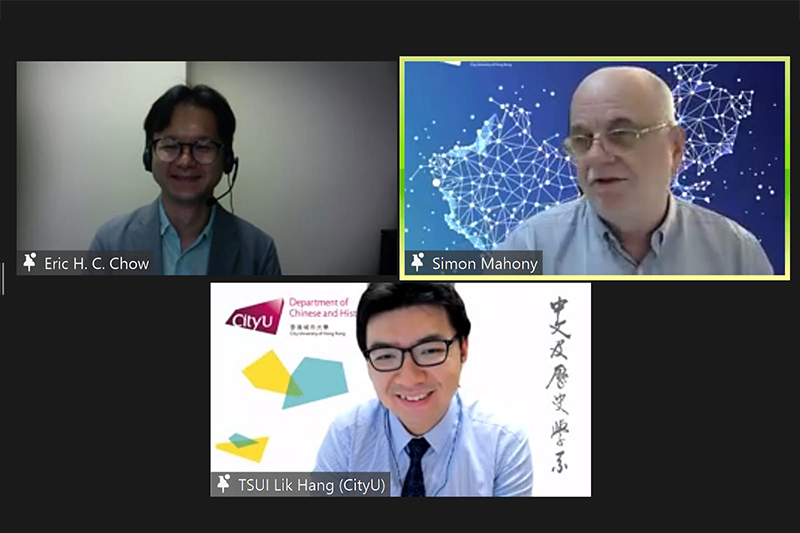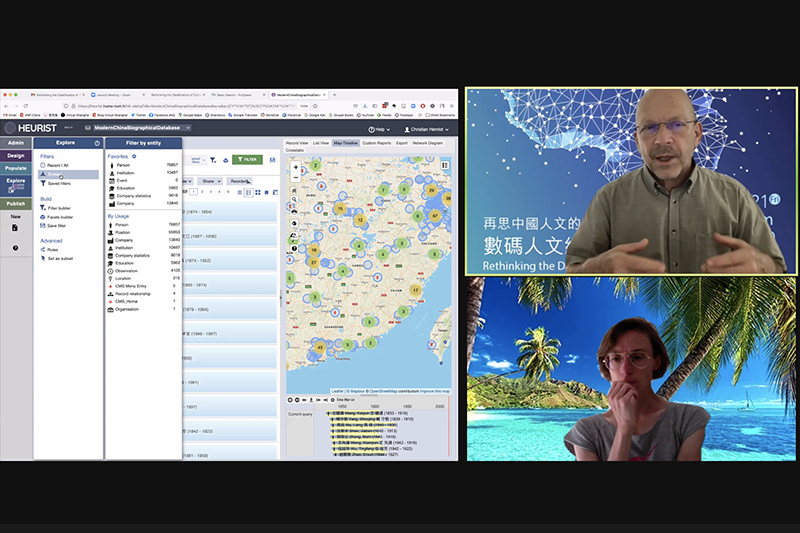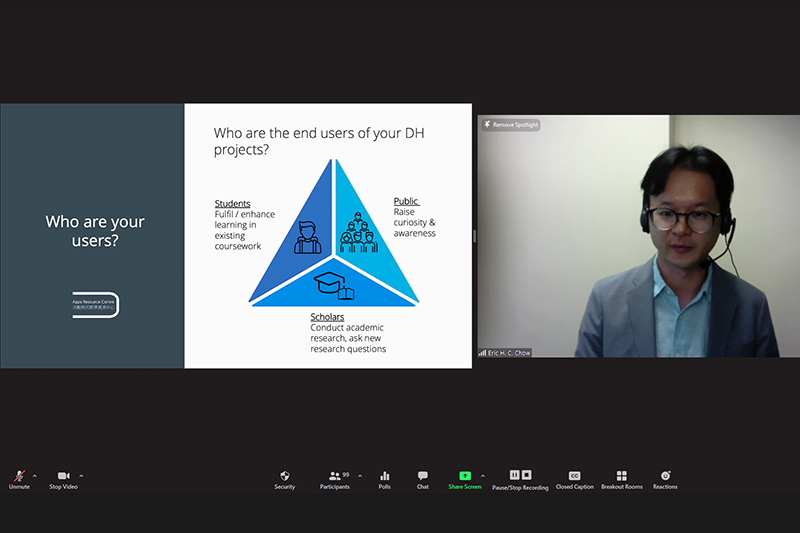The digital humanities have undergone rapid development and created plenty of new opportunities and possibilities for the academic fields in recent decades. The latest research of digital humanities focuses not only on data accumulation but also on rethinking and revising various topics in Chinese humanities. With the aid of datafication, the study of Chinese cultural materials in digital form goes far beyond the Chinese-speaking world. To facilitate discussions on the current development of digital humanities and to provoke further reflections, CityU's Department of Chinese and History (CAH) organised a workshop entitled "Rethinking the Datafication of Culture in the Chinese World: An Online Workshop on the Digital Humanities" on 18 June 2021. A group of international researchers were invited to share their research outcomes and insights on this topic. The full-day virtual workshop was attended by about 220 participants locally and afar.
To commence the workshop, Head of CAH Professor CHING May-bo gave a welcoming speech to the participants. Dr TSUI Lik-hang, Assistant Professor of CAH and the convenor of the workshop, gave an overview of the current development of digital humanities in the Chinese world and noted the significance of digital society in the strategic research themes of the University.
Following the opening address, Dr CHEN Jing from Hong Kong Polytechnic University delivered a talk about poetry exchange networks among 18th-Century Women Poets in China. She introduced the background and datafication methodology of premodern Chinese literature and showed three cases of women's literary communities in the Qing dynasty revealed by social network analysis. The application of datafication fosters a better understanding of Chinese literature in a more comprehensive way by juxtaposing close reading with distant reading and combining quantitative analysis and qualitative analysis.

In the second presentation, Professor Simon MAHONY, Executive Director of the Research Centre for Digital Publishing and Digital Humanities and Professor at Beijing Normal University at Zhuhai, compared the differences and similarities between the eastern and western approaches in studying digital humanities, based on his career in both worlds. He also introduced the challenges in researching Chinese humanities data and the trend of digital humanities community building in China.
Dr HE Jie, Associate Professor at the School of Architecture in Tianjin University and Director of Spatial Humanities and Place Computation Laboratory, then spoke on Chang'an of Tang Dynasty in literary cartography. He sought to reflect on the construction of data-driven research on historical cities based on his research outcomes and discussed the interactions between historical contexts and literary narratives. He believed that digital humanities would renew the traditional understanding of Chinese contexts and spark many interesting discussions with regards to Chinese urban history, both historical and imagined.
During last presentation of the morning, Dr CHYU Shih-wen from National Taiwan Normal University shared her recent observations and new perspectives on the study of the Shiji (Records of the Grand Historian), a monumental historical work of ancient China. The presentation centred on the dispersion of keywords in the Shiji. She also introduced useful Chinese text analysis tools such as CORPRO, which is helpful in visualising the distribution and patterns of keywords. She also pointed out that there is often more than one perspective when looking at a text, and it is essential to choose the right tools according to the context.

The second half of the workshop commenced with a talk co-presented by Professor Christian HENRIOT and Dr Cécile ARMAND from Aix-Marseille University. Professor Henriot first introduced the Modern China Biographical Database (MCBD) and the rationale behind building it. He went on to explain that MCBD sought to collect biographical data on any individual active in China, regardless of their nationality, through systematic data mining of historical sources. Dr Armand then showed the audience the interface of MCBD and performed actual searches, showcasing the impressive depth and scope of the sophisticated system.
Moving on, Dr Wendy WONG from the Chinese University of Hong Kong Library demonstrated numerous tools for conducting data-mining. Her presentation showed how technologies facilitate digital humanities research on Hong Kong literature and how the relevant projects embody the FAIR data principles that aim at making data reusable.

Coming up next was the sharing delivered by Dr Eric CHOW, Manager of the Apps Resource Centre in Hong Kong Baptist University. Dr Chow demonstrated an educational app, which included 524 entries about Chinese calligraphy on buildings in Hong Kong, and said the completion of this app has got him started on the topic of digital humanities. He further explained the importance of understanding the end-users of digital humanities projects, and remarked the importance of developing and teaching basic coding skills when it comes to engaging students who want to be involved in digital humanities.
Last but not least, a workshop session was given by Dr CHEN Shih-pei, Senior Research Scholar at Max Planck Institute for the History of Science. She introduced the application of LoGaRT, a digital research tool that allows researchers to carry out historical investigations with digitised Chinese local gazetteers (difangzhi). Meanwhile, she explained how it could enhance the efficiency and effectiveness in data collection and aids scholars to tackle the challenges in data interpretation. Though the use of LoGaRT helps big data collection and statistical analyses, she reiterated that digital tools could not fully replace the role of humans in digital humanities research, especially in the work of historical data interpretation.
(Content credit: LEUNG Kin-yi and MA Ho-yam, CLASS students)
Cover photo: Dr CHEN Shih-pei, Senior Research Scholar at Max Planck Institute for the History of Science, introduced the application of LoGaRT for researchers to carry out historical investigations with digitised Chinese local gazetteers, during the workshop session.